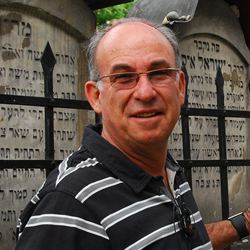By Tali Feinberg
Reprinted from the Cape Jewish Chronicle

CAPE TOWN, South Africa — Every year on Yom Hashoah, Holocaust survivors and Jewish communities sing the song Zog Nit Keynmol (‘We are Still Here’), known as the Partisan Song. However, the Yiddish lyrics and decline of survivors means that the song is being lost to history.
Now, a new initiative seeks to teach the song to schoolchildren across the globe, allowing them to connect with each other and their history.
The project is led by Eli Rabinowitz, a film maker, web developer, photographer and Jewish education specialist. He explains: “In January 2016, I received an email from Rabbi Craig Kacev, Head of Jewish Studies at King David High Schools, asking if I would talk at their high school assemblies about the Partisan Song sung in Yiddish at Yom Hashoah commemorations. He pointed out that the students didn’t understand the words or the song’s full significance.”
Eli visited King David Schools in February, addressing over 1000 learners and teaching them the Partisan Song. He also hosts ‘online classes,” connecting learners from across the world using technology. “I thought this would make a good subject for an online class, hosted by Herzlia High School (in Cape Town) and attended’ by schools from the former Soviet Union.”
Eli did just that at Herzlia in February, where Steve Sherman of Living Maths set up the class using Youtube and Google Hangouts, connecting with 8 schools from the Former Soviet Union (FSU), many in Lithuania.
The Herzlia Vocal Ensemble sang the partisan song in Yiddish, Hebrew and English, which can be watched above. It was a wonderful rendition, sung in young and enthusiastic voices.
Learners introduced their school and town, and Eli presented a compilation of the videos that each school had sent to him. These included clips on the partisans, the ghettos, Hirsh Glik (the writer of the song), and the original poem.
The learners watched a short inspirational audio recording of survivor Phillip Maisel, talking to 11 year old Melbourne students about his friend, Hirsh Glik. Phillip was one of three people to hear the poem for the first time after it was written in 1943. The full video of the online meeting can be viewed here:
Eli says that the motivation behind the project is “to educate and give meaning to the Partisan Song – its history, significance and inspiration; and to continue the legacy of the survivors and partisans. This song became their anthem as well as a protest song for others. It is now time for our youth to take it on board and carry it forward for future generations.”
He adds that students in the schools in the former Soviet Union are keen to connect with Jewish Day schools in South Africa. They are aware that many Litvaks landed up here. “The online schools all communicated well with one another in English and loved Herzlia’s spirited presentation of the song.”
In terms of Holocaust education in Lithuania, Eli explains that 119 Tolerance Education Centres operate in schools throughout Lithuania. A co-ordinator in Vilnius assists these schools in sourcing material of Jewish life and the Holocaust.
Generally the English and History teachers work in teams and often set up programmes in conjunction with Jews connecting back to their shtetls. “15 year old students in Lithuania are interested in learning about Jews, who in some cases made up more than 50 percent of the local population. Today, there are no longer Jews in almost all these towns,” he says.
Eli says that he has not personally encountered antisemitism in Lithuania, but it does exists. “There are also unresolved issues with how some perpetrators are regarded in Lithuania.”
How can Cape Town Jewish community members get involved in the Partisan Song Project? Eli says that we can support the work that the Jewish Studies staff at Herzlia are doing. “Encourage participation by your children and grandchildren in learning the song and its meaning. Encourage your shul choir to learn and to sing it. Cantor Ivor Joffe is able to assist with the music. Promote this project to all the Jewish organisations you are connected with. You can also connect to the web portal at http://elirab.me/zog-nit-keynmol/ and learn more. Share the link!”
Communities can highlight the Partisan Song in their Yom Hashoah ceremonies this year by arranging for students to sing it in Yiddish, Hebrew and English, as Herzlia has done. “Let them recite the English version of the poem – the words are beautiful. It is a poem of hope and rekindling the spirit! If any students are visiting Poland on March of the Living, encourage their educators to learn it together with their students, and to sing it in Poland. They can practice in the bus!”
Eli’s plans for the future are to expand the programme of learning to schools, Jewish organisations and choirs in other countries where there are substantial Jewish communities, such as in the UK, Canada, USA, Israel, South Africa, South America and Australia. This also applies to more schools in Europe and in the former Soviet Union. “Further projects will connect Jews to their shtetls and to others with a common heritage. I have been talking to the Jewish Digital Archive Project in Cape Town about this.”
Sharing his background, Eli says that he lives in Perth (Australia) and was born in Cape Town. “I matriculated at Sea Point Boys High School in 1969, graduated from UCT in 1974 and migrated to Perth in 1986. My roots lie in many places – Latvia, Lithuania, Poland, South Africa and Israel. The Partisan Song, with its words of hope, is my way of bringing us all together!”
Eli can be contacted at eli@elirab.com or on his website http://elirab.me